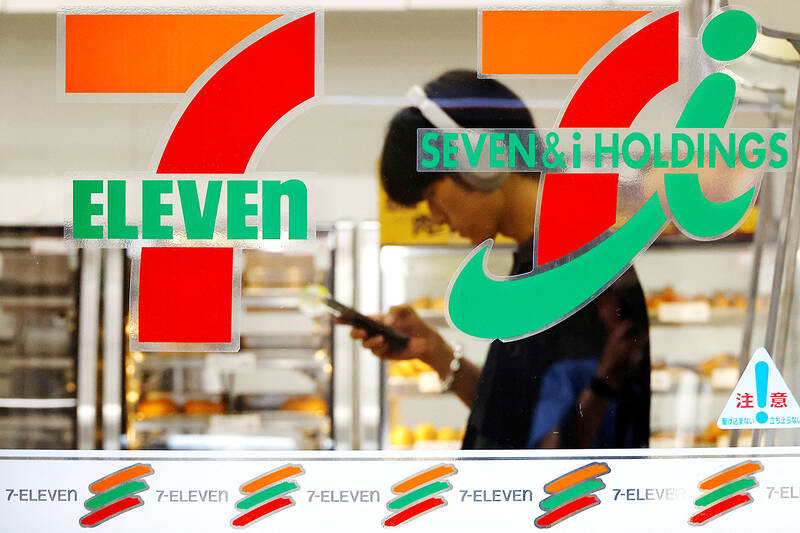Seven & i Holdings Co, the Japanese convenience store chain operator valued at about US$31 billion, has received a buyout proposal from Canadian rival Alimentation Couche-Tard Inc in what would be the largest-ever foreign takeover of a Japanese company if realized.
The “confidential, preliminary” offer would be examined by an independent committee and the board of directors has made no determination at this time whether to accept or reject it, said Seven & i in a statement yesterday, following a report on the bid by Japan’s Nikkei newspaper. Neither offered details on the value of Couche-Tard’s offer.
Shares in the Japanese company jumped 23 percent in Tokyo yesterday, their largest gain on record.

Photo: Reuters
Seven & i has come under pressure from activist fund ValueAct Capital Management LP over perceptions that its assets are worth more than the company is capitalizing on. In reaction, it has taken restructuring measures and initiated a buyback after fending off efforts to oust chief executive officer Ryuichi Isaka.
ValueAct previously pushed the Japanese retailer to narrow its business focus to 7-Eleven stores, saying that as a standalone listed company the convenient store business could be worth as much as ¥8,500 per share. Seven & i shares closed at ¥2,161 yesterday.
While best known for its 7-Eleven stores, the company’s operations also include Denny’s Corp’s Japan restaurants, the Ito-Yokado supermarket chain and its own bank. Globally, its empire spans 85,000 convenience stores, gasoline stations and retail outlets.
Couche-Tard, with a market value of C$80 billion (US$58.5 billion), operates convenience stores around the world under its own brand, as well as Circle K and Ingo.
“It all depends on the price, and I guess the weak yen has made it more attractive and anything north of ¥7 trillion, the management would have a tough time rejecting,” said Amir Anvarzadeh, a strategist at Asymmetric Advisors Pte.
However, “knowing the Seven & i management, you can bet on them resisting this if the price is lower,” he added.
Couche-Tard’s balance sheet itself might not be strong enough to sustain a strong cash offer, LightStream Research analyst Mio Kato said.
“I don’t think Seven & i would want to sell and without an attractive cash offer, I think the probability of something happening is quite slim,” he said.

Semiconductor business between Taiwan and the US is a “win-win” model for both sides given the high level of complementarity, the government said yesterday responding to tariff threats from US President Donald Trump. Home to the world’s largest contract chipmaker, Taiwan Semiconductor Manufacturing Co (TSMC, 台積電), Taiwan is a key link in the global technology supply chain for companies such as Apple Inc and Nvidia Corp. Trump said on Monday he plans to impose tariffs on imported chips, pharmaceuticals and steel in an effort to get the producers to make them in the US. “Taiwan and the US semiconductor and other technology industries

SMALL AND EFFICIENT: The Chinese AI app’s initial success has spurred worries in the US that its tech giants’ massive AI spending needs re-evaluation, a market strategist said Chinese artificial intelligence (AI) start-up DeepSeek’s (深度求索) eponymous AI assistant rocketed to the top of Apple Inc’s iPhone download charts, stirring doubts in Silicon Valley about the strength of the US’ technological dominance. The app’s underlying AI model is widely seen as competitive with OpenAI and Meta Platforms Inc’s latest. Its claim that it cost much less to train and develop triggered share moves across Asia’s supply chain. Chinese tech firms linked to DeepSeek, such as Iflytek Co (科大訊飛), surged yesterday, while chipmaking tool makers like Advantest Corp slumped on the potential threat to demand for Nvidia Corp’s AI accelerators. US stock

The US Federal Reserve is expected to announce a pause in rate cuts on Wednesday, as policymakers look to continue tackling inflation under close and vocal scrutiny from US President Donald Trump. The Fed cut its key lending rate by a full percentage point in the final four months of last year and indicated it would move more cautiously going forward amid an uptick in inflation away from its long-term target of 2 percent. “I think they will do nothing, and I think they should do nothing,” Federal Reserve Bank of St Louis former president Jim Bullard said. “I think the

SUBSIDIES: The nominee for commerce secretary indicated the Trump administration wants to put its stamp on the plan, but not unravel it entirely US President Donald Trump’s pick to lead the agency in charge of a US$52 billion semiconductor subsidy program declined to give it unqualified support, raising questions about the disbursement of funds to companies like Intel Corp and Taiwan Semiconductor Manufacturing Co (台積電). “I can’t say that I can honor something I haven’t read,” Howard Lutnick, Trump’s nominee for commerce secretary, said of the binding CHIPS and Science Act awards in a confirmation hearing on Wednesday. “To the extent monies have been disbursed, I would commit to rigorously enforcing documents that have been signed by those companies to make sure we get